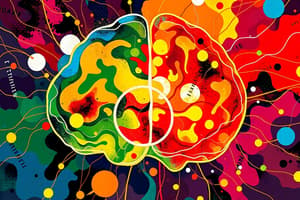Podcast
Questions and Answers
What is a core premise of evolutionary psychology?
What is a core premise of evolutionary psychology?
- It excludes biological influences on psychological processes.
- It emphasizes the role of learning in psychological development.
- It focuses solely on situational factors affecting behavior.
- It aims to understand psychological traits through natural selection. (correct)
Which function is primarily associated with the brain's information-processing capabilities?
Which function is primarily associated with the brain's information-processing capabilities?
- Managing only conscious thoughts and responses.
- Responding solely to external inputs.
- Interpreting higher-level cognitive processes. (correct)
- Filtering irrelevant sensory information.
In the context of learned optimism, what does the 'Disputation' step involve?
In the context of learned optimism, what does the 'Disputation' step involve?
- Refocusing on positive beliefs without questioning.
- Challenging and questioning negative beliefs. (correct)
- Ignoring adverse circumstances completely.
- Accepting negative beliefs as truths.
What is the main focus of cognitive psychology in relation to memory?
What is the main focus of cognitive psychology in relation to memory?
Which need follows the love/belonging need in Maslow's hierarchy of needs?
Which need follows the love/belonging need in Maslow's hierarchy of needs?
What role does attention play in perception?
What role does attention play in perception?
What do adaptive mechanisms in cognitive psychology refer to?
What do adaptive mechanisms in cognitive psychology refer to?
What is the primary focus of positive psychology?
What is the primary focus of positive psychology?
What is the primary function of the occipital lobe?
What is the primary function of the occipital lobe?
Which part of the nervous system controls voluntary muscle movements?
Which part of the nervous system controls voluntary muscle movements?
How does the autonomic nervous system primarily function?
How does the autonomic nervous system primarily function?
Which of the following is a key area of focus in biological psychology related to motivated behavior?
Which of the following is a key area of focus in biological psychology related to motivated behavior?
What role does the parietal lobe play in the human brain?
What role does the parietal lobe play in the human brain?
What is a key component of the learning and memory processes in biological psychology?
What is a key component of the learning and memory processes in biological psychology?
Which system is responsible for controlling the fight-or-flight response?
Which system is responsible for controlling the fight-or-flight response?
What does the process of sensation and perception primarily involve?
What does the process of sensation and perception primarily involve?
What is an example of inaccurate memory retrieval in cognitive processing?
What is an example of inaccurate memory retrieval in cognitive processing?
How do cognitive biases affect human cognition?
How do cognitive biases affect human cognition?
What defines conscious processing in cognitive functions?
What defines conscious processing in cognitive functions?
What is an example of individual differences in personality affecting cognition?
What is an example of individual differences in personality affecting cognition?
Which aspect of cognitive processing can lead to misjudgments during decision-making?
Which aspect of cognitive processing can lead to misjudgments during decision-making?
What does the term 'confirmation bias' refer to in cognitive psychology?
What does the term 'confirmation bias' refer to in cognitive psychology?
Why is understanding both similarities and individual differences important in psychology?
Why is understanding both similarities and individual differences important in psychology?
Which of the following best illustrates the concept of motivated behavior mechanisms in cognition?
Which of the following best illustrates the concept of motivated behavior mechanisms in cognition?
Flashcards
Hierarchy of Needs
Hierarchy of Needs
Maslow's theory that basic needs (physiological and safety) must be met before higher-level needs (love/belonging, esteem, and self-actualization) can be pursued.
Self-Actualization
Self-Actualization
The highest level in Maslow's hierarchy, representing personal growth and fulfillment.
Episodic Memory
Episodic Memory
Memory of personal experiences tied to specific times and events.
Attention
Attention
Signup and view all the flashcards
Perception
Perception
Signup and view all the flashcards
Cognitive Psychology
Cognitive Psychology
Signup and view all the flashcards
Adaptive Mechanisms
Adaptive Mechanisms
Signup and view all the flashcards
Positive Psychology
Positive Psychology
Signup and view all the flashcards
Learned Optimism (ABCDE Model)
Learned Optimism (ABCDE Model)
Signup and view all the flashcards
Evolutionary Psychology
Evolutionary Psychology
Signup and view all the flashcards
Accuracy vs. Inaccuracy (Cognition)
Accuracy vs. Inaccuracy (Cognition)
Signup and view all the flashcards
Cognitive Biases
Cognitive Biases
Signup and view all the flashcards
Conscious Processing
Conscious Processing
Signup and view all the flashcards
Unconscious Processing
Unconscious Processing
Signup and view all the flashcards
Similarities (Psychology)
Similarities (Psychology)
Signup and view all the flashcards
Individual Differences
Individual Differences
Signup and view all the flashcards
Introverted vs Extroverted
Introverted vs Extroverted
Signup and view all the flashcards
Occipital Lobe Function
Occipital Lobe Function
Signup and view all the flashcards
Parietal Lobe Function
Parietal Lobe Function
Signup and view all the flashcards
Temporal Lobe Function
Temporal Lobe Function
Signup and view all the flashcards
Biological Psychology Focus
Biological Psychology Focus
Signup and view all the flashcards
Peripheral Nervous System
Peripheral Nervous System
Signup and view all the flashcards
Somatic Nervous System
Somatic Nervous System
Signup and view all the flashcards
Autonomic Nervous System
Autonomic Nervous System
Signup and view all the flashcards
Sympathetic Nervous System
Sympathetic Nervous System
Signup and view all the flashcards
Sensation and Perception
Sensation and Perception
Signup and view all the flashcards
Motivated Behavior
Motivated Behavior
Signup and view all the flashcards
Control of Movement
Control of Movement
Signup and view all the flashcards
Learning and Memory
Learning and Memory
Signup and view all the flashcards
Study Notes
Introduction to Psychology
- Psychology is the scientific study of the mind and behavior.
- The word "psychology" comes from the Greek words "psyche" (life) and "logos" (explanation).
- Psychologists rely on scientific methods.
- "Everyday scientists" use research methods to answer questions about behavior.
- Intuition is not always accurate in collecting and interpreting data.
- Hindsight bias is the tendency to think we could have predicted something that has already happened.
- Psychology relies on empirical methods (collecting and organizing data, drawing conclusions).
- Scientific methods use assumptions, rules, and procedures.
Levels of Explanation in Psychology
- Lower: Biological processes (e.g., genetics, neurotransmitters).
- Middle: Interpersonal processes (e.g., interactions, therapy).
- Higher: Cultural and social processes (e.g., culture, time period).
Challenges of Studying Psychology
- Individual differences exist in physical and psychological dimensions.
- Behavior is often influenced by multiple factors.
- Many behaviors occur outside conscious awareness.
Schools of Psychology
- Structuralism: Uses introspection to identify basic elements of psychological experience.
- Key contributor: Wilhelm Wundt.
- Functionalism: Seeks to understand why animals and humans have developed particular psychological aspects.
- Key contributor: William James.
- Psychodynamic: Focuses on unconscious thoughts, feelings, and early childhood experiences.
- Key contributors: Sigmund Freud, Carl Jung, Alfred Adler, Erik Erikson.
- Behaviorism: Focuses on observable behavior and how environmental factors affect it.
- Key contributors: John Watson, B.F. Skinner.
- Cognitive: Studies mental processes like perception, thinking, memory, and judgment.
- Socio-cultural: Examines how social situations and cultures influence behavior.
Key Debates in Psychology
- Nature vs. Nurture: Debate on the relative importance of genetics (nature) and environment (nurture) in development.
- Free Will vs. Determinism: Free will - the ability to make independent choices. Determinism - behavior is influenced by internal or external factors.
Other Important Topics
- Consciousness vs. Unconscious Processing: Conscious - being aware of thoughts and actions; Unconscious - mental processes outside awareness.
- Psychology Fields: Specific areas including biopsychology, clinical psychology, cognitive psychology, developmental psychology, etc.
- Ethical Research: Moral principles and ethical codes that govern research, including avoiding harm and protecting participants.
- Specific Psychological Theories: Including operant and classical conditioning.
Studying That Suits You
Use AI to generate personalized quizzes and flashcards to suit your learning preferences.




